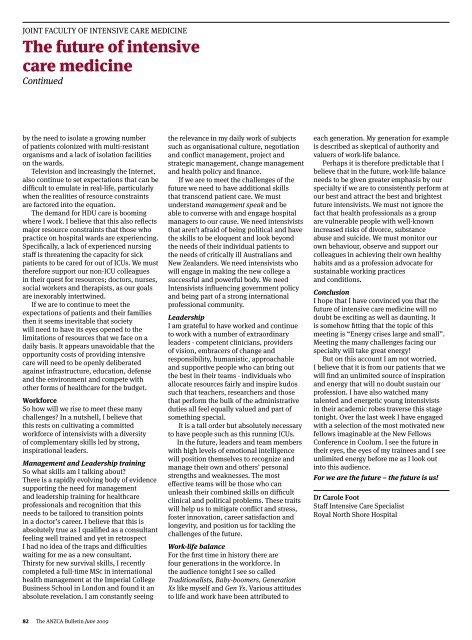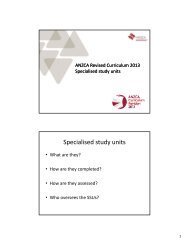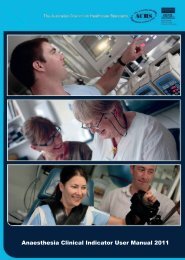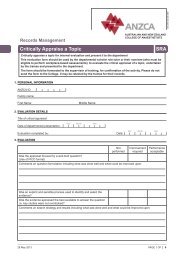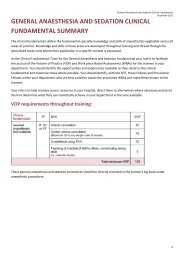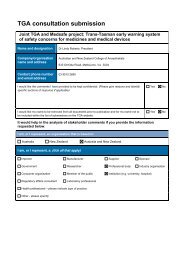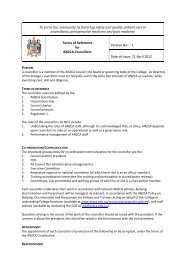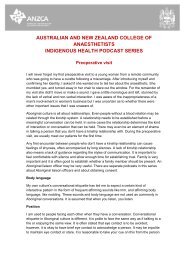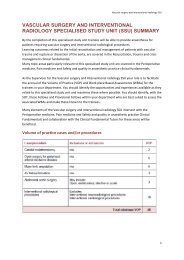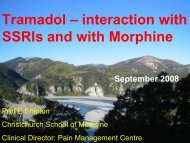ANZCA Bulletin - June 2009 - Australian and New Zealand College ...
ANZCA Bulletin - June 2009 - Australian and New Zealand College ...
ANZCA Bulletin - June 2009 - Australian and New Zealand College ...
- No tags were found...
Create successful ePaper yourself
Turn your PDF publications into a flip-book with our unique Google optimized e-Paper software.
Joint Faculty of Intensive Care MedicineThe future of intensivecare medicineContinuedby the need to isolate a growing numberof patients colonized with multi-resistantorganisms <strong>and</strong> a lack of isolation facilitieson the wards.Television <strong>and</strong> increasingly the Internet,also continue to set expectations that can bedifficult to emulate in real-life, particularlywhen the realities of resource constraintsare factored into the equation.The dem<strong>and</strong> for HDU care is boomingwhere I work. I believe that this also reflectsmajor resource constraints that those whopractice on hospital wards are experiencing.Specifically, a lack of experienced nursingstaff is threatening the capacity for sickpatients to be cared for out of ICUs. We musttherefore support our non-ICU colleaguesin their quest for resources; doctors, nurses,social workers <strong>and</strong> therapists, as our goalsare inexorably intertwined.If we are to continue to meet theexpectations of patients <strong>and</strong> their familiesthen it seems inevitable that societywill need to have its eyes opened to thelimitations of resources that we face on adaily basis. It appears unavoidable that theopportunity costs of providing intensivecare will need to be openly deliberatedagainst infrastructure, education, defense<strong>and</strong> the environment <strong>and</strong> compete withother forms of healthcare for the budget.WorkforceSo how will we rise to meet these manychallenges? In a nutshell, I believe thatthis rests on cultivating a committedworkforce of intensivists with a diversityof complementary skills led by strong,inspirational leaders.Management <strong>and</strong> Leadership trainingSo what skills am I talking about?There is a rapidly evolving body of evidencesupporting the need for management<strong>and</strong> leadership training for healthcareprofessionals <strong>and</strong> recognition that thisneeds to be tailored to transition pointsin a doctor’s career. I believe that this isabsolutely true as I qualified as a consultantfeeling well trained <strong>and</strong> yet in retrospectI had no idea of the traps <strong>and</strong> difficultieswaiting for me as a new consultant.Thirsty for new survival skills, I recentlycompleted a full-time MSc in internationalhealth management at the Imperial <strong>College</strong>Business School in London <strong>and</strong> found it anabsolute revelation. I am constantly seeingthe relevance in my daily work of subjectssuch as organisational culture, negotiation<strong>and</strong> conflict management, project <strong>and</strong>strategic management, change management<strong>and</strong> health policy <strong>and</strong> finance.If we are to meet the challenges of thefuture we need to have additional skillsthat transcend patient care. We mustunderst<strong>and</strong> management speak <strong>and</strong> beable to converse with <strong>and</strong> engage hospitalmanagers to our cause. We need intensiviststhat aren’t afraid of being political <strong>and</strong> havethe skills to be eloquent <strong>and</strong> look beyondthe needs of their individual patients tothe needs of critically ill <strong>Australian</strong>s <strong>and</strong><strong>New</strong> Zeal<strong>and</strong>ers. We need intensivists whowill engage in making the new college asuccessful <strong>and</strong> powerful body. We needIntensivists influencing government policy<strong>and</strong> being part of a strong internationalprofessional community.LeadershipI am grateful to have worked <strong>and</strong> continueto work with a number of extraordinaryleaders - competent clinicians, providersof vision, embracers of change <strong>and</strong>responsibility, humanistic, approachable<strong>and</strong> supportive people who can bring outthe best in their teams - individuals whoallocate resources fairly <strong>and</strong> inspire kudossuch that teachers, researchers <strong>and</strong> thosethat perform the bulk of the administrativeduties all feel equally valued <strong>and</strong> part ofsomething special.It is a tall order but absolutely necessaryto have people such as this running ICUs.In the future, leaders <strong>and</strong> team memberswith high levels of emotional intelligencewill position themselves to recognize <strong>and</strong>manage their own <strong>and</strong> others’ personalstrengths <strong>and</strong> weaknesses. The mosteffective teams will be those who canunleash their combined skills on difficultclinical <strong>and</strong> political problems. These traitswill help us to mitigate conflict <strong>and</strong> stress,foster innovation, career satisfaction <strong>and</strong>longevity, <strong>and</strong> position us for tackling thechallenges of the future.Work-life balanceFor the first time in history there arefour generations in the workforce. Inthe audience tonight I see so calledTraditionalists, Baby-boomers, GenerationXs like myself <strong>and</strong> Gen Ys. Various attitudesto life <strong>and</strong> work have been attributed toeach generation. My generation for exampleis described as skeptical of authority <strong>and</strong>valuers of work-life balance.Perhaps it is therefore predictable that Ibelieve that in the future, work-life balanceneeds to be given greater emphasis by ourspecialty if we are to consistently perform atour best <strong>and</strong> attract the best <strong>and</strong> brightestfuture intensivists. We must not ignore thefact that health professionals as a groupare vulnerable people with well-knownincreased risks of divorce, substanceabuse <strong>and</strong> suicide. We must monitor ourown behaviour, observe <strong>and</strong> support ourcolleagues in achieving their own healthyhabits <strong>and</strong> as a profession advocate forsustainable working practices<strong>and</strong> conditions.ConclusionI hope that I have convinced you that thefuture of intensive care medicine will nodoubt be exciting as well as daunting. Itis somehow fitting that the topic of thismeeting is “Energy crises large <strong>and</strong> small”.Meeting the many challenges facing ourspecialty will take great energy!But on this account I am not worried.I believe that it is from our patients that wewill find an unlimited source of inspiration<strong>and</strong> energy that will no doubt sustain ourprofession. I have also watched manytalented <strong>and</strong> energetic young intensivistsin their academic robes traverse this stagetonight. Over the last week I have engagedwith a selection of the most motivated newfellows imaginable at the <strong>New</strong> FellowsConference in Coolum. I see the future intheir eyes, the eyes of my trainees <strong>and</strong> I seeunlimited energy before me as I look outinto this audience.For we are the future – the future is us!Dr Carole FootStaff Intensive Care SpecialistRoyal North Shore Hospital82The <strong>ANZCA</strong> <strong>Bulletin</strong> <strong>June</strong> <strong>2009</strong>


